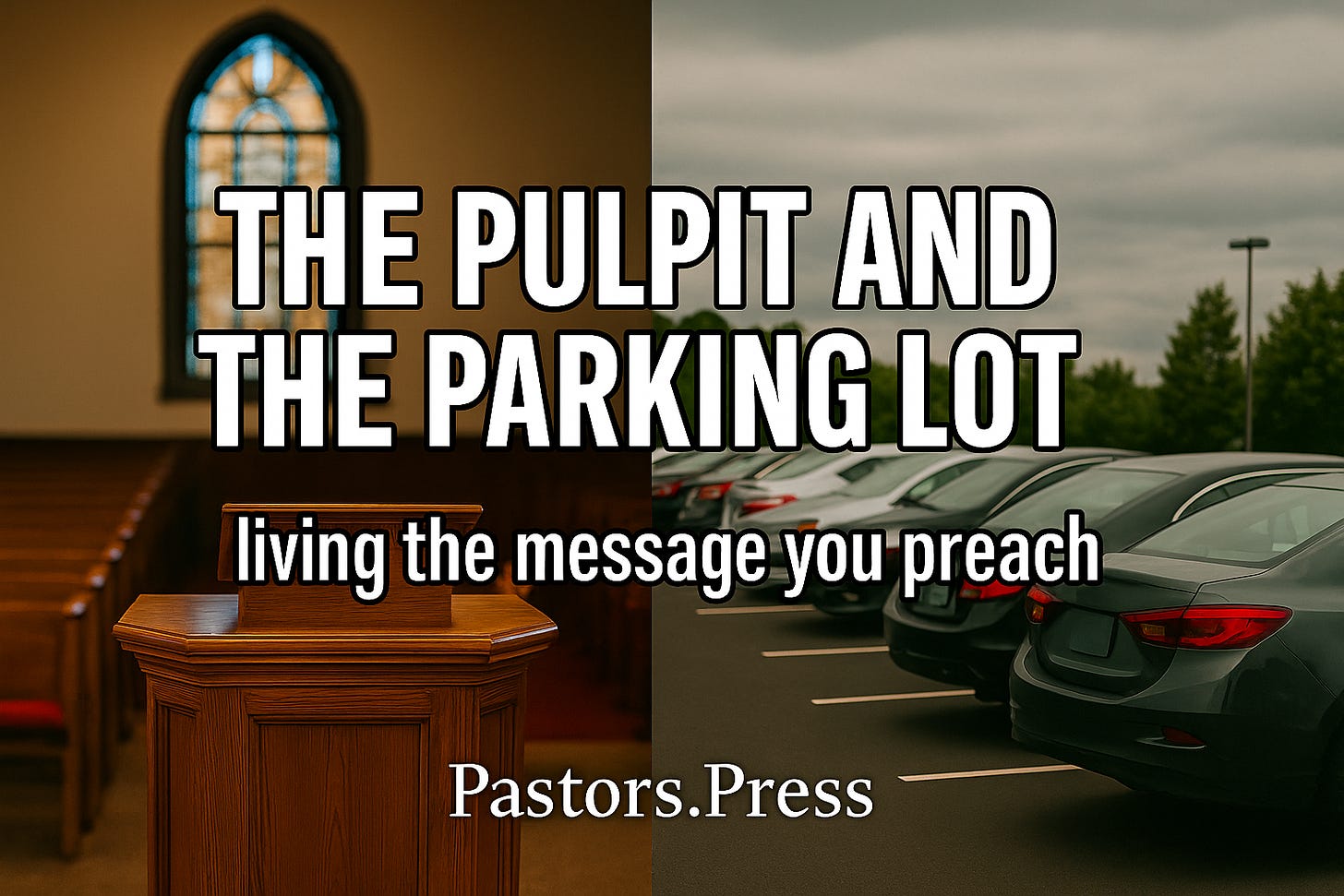The Pulpit and the Parking Lot
Living the Message You Preach
Key Verse:
"Whatever happens, conduct yourselves in a manner worthy of the gospel of Christ." — Philippians 1:27a
Introduction: The Two Stages of Ministry
There are two stages where a pastor's credibility is tested: the pulpit and the parking lot. One is elevated, spotlighted, and filled with biblical authority. The other is mundane, grounded, and filled with human interaction. In the pulpit, the pastor proclaims truth. In the parking lot, he proves it.
The effectiveness of your ministry is not measured solely by the clarity of your exposition or the strength of your illustrations—it is measured by the consistency of your life. You can preach with fire on Sunday and undo it with flesh on Monday. In a world filled with moral failures and platform collapses, nothing is more radical, more rare, and more powerful than a pastor who lives what he preaches.
The apostle Paul urged the Philippians to "conduct yourselves in a manner worthy of the gospel." That charge is just as vital for pastors. If we’re not careful, we can become experts in presenting truth while quietly failing to practice it. This is not just a credibility issue; it’s a spiritual integrity issue.
The High Cost of Hypocrisy
The word “hypocrite” comes from the ancient Greek term for an actor—someone who wears a mask. Sadly, many pastors today are tempted to put on a different face in the pulpit than they do in real life. The result? Disillusioned congregations, cynical observers, and the erosion of pastoral authority.
“What you are in the pulpit must be what you are in the prayer closet, the family room, and the supermarket.” — Warren Wiersbe
When pastors thunder against sin from the pulpit but harbor pride, bitterness, or lust in their private life, it leaves a stain not just on their ministry, but on the Gospel itself. One of the main reasons people leave churches today is not doctrinal confusion, but pastoral inconsistency.
Jesus had His harshest words not for sinners, but for religious leaders who preached but didn’t practice. In Matthew 23:3, He warned the crowds: “Do not do what they do, for they do not practice what they preach.”
The Power of Living the Message
On the other hand, nothing validates a sermon like a shepherd who lives it out. A gentle word in a counseling room, a patient spirit with a critic, or a humble apology when wrong—these things speak louder than three points and a poem.
“A holy life will produce the deepest impression. Lighthouses blow no horns; they only shine.” — D.L. Moody
People may not remember every sermon you preach. But they will remember how you treated the visitor in the parking lot, how you responded to disappointment, and whether your family experienced the same gospel you offered the flock.
Your real congregation may not be sitting in pews—it may be watching from the shadows: ushers, volunteers, youth, janitors, children. They are looking to see if the pulpit version of you is the same as the hallway version. Consistency breeds trust, and trust opens the door to transformation.
Practical Ways to Align the Pulpit and the Parking Lot
Here are seven powerful and practical habits that help ensure the life you live backs up the sermons you preach.
1. Preach to Yourself Before You Preach to Others
Before you prepare your sermon outline, prepare your soul. Ask:
“Have I submitted to this truth?”
“Is this rebuking, correcting, encouraging, or convicting me first?”
David cried out, “Search me, O God, and know my heart” (Psalm 139:23). That’s a pastor’s starting point. Sermons that have not first passed through the preacher’s heart tend to sound hollow. They may stir minds, but they don’t pierce hearts.
2. Be Consistent in Your Speech and Spirit
Congregations quickly spot discrepancies between the pulpit and the pastor’s personality. If your tone on Sunday is gracious and humble, but you're impatient, dismissive, or arrogant off-stage, the dissonance will erode trust.
James 3:10 says, “Out of the same mouth come praise and cursing. My brothers and sisters, this should not be.”
Let your everyday speech—whether it’s counseling a member, correcting a team, or chatting at lunch—be consistent with the truth you proclaim publicly.
3. Include Your Family in the Gospel You Preach
What you say about grace, forgiveness, and the fruit of the Spirit should be reflected in your home life. Your spouse and children know whether your public persona matches your private habits. This is often where your greatest integrity test lies.
Paul's pastoral qualifications in 1 Timothy 3 begin in the home: “He must manage his own family well.” If your family does not feel safe, heard, and pastored, your ministry is already compromised—no matter how eloquently you preach.
4. Cultivate Daily Repentance and Transparency
Hypocrisy doesn’t begin with public scandal; it begins with private neglect. Keeping a short list with God keeps your conscience tender. Don’t let hidden sins become strongholds.
David prayed, “Create in me a clean heart, O God” (Psalm 51:10). Build the habit of asking God daily to examine your motives. Confess even the small inconsistencies. They add up quickly.
Also, consider having a pastoral accountability partner who has permission to ask you the hard questions about purity, humility, finances, and relationships.
5. Practice Servant Leadership Off the Stage
Jesus knelt to wash the disciples’ feet before He taught them the meaning of the cross. The greatest leaders serve long before they preach.
Philippians 2:7 says Jesus “made Himself nothing… taking the very nature of a servant.” Look for ways to be visibly available to your church in lowly tasks:
Pray with the custodian.
Show up early to greet.
Walk the parking lot.
Sit with the grieving.
Hug the child whose parent is in rehab.
Leadership in the parking lot is as holy as leadership from the platform.
6. Guard Against the Subtle Drift of Image Management
It’s possible to become more concerned with how people perceive your preaching than whether you’re actually living it. Don’t build a brand—build a life. Don’t curate a persona—cultivate holiness.
Paul told Timothy, “Watch your life and doctrine closely” (1 Timothy 4:16). Life precedes doctrine in that list. People will not be changed by a polished preacher—they will be changed by a crucified one.
7. Create Patterns of Humility and Rest
Exhaustion leads to shortcuts. The more tired you are, the more vulnerable you are to compromise.
Mark 1:35 shows Jesus retreating to a solitary place to pray—not after failure, but after success. If Christ needed rest and solitude, how much more do we?
Build sabbath into your week. Schedule time for spiritual renewal, not just sermon prep. Practice anonymity occasionally—attend a service you’re not leading, serve where no one sees. These rhythms recalibrate the soul and anchor your integrity.
A Sermon Lived Is a Sermon Believed
When the pulpit and the parking lot match, there is spiritual power. The Gospel becomes not only preached—it becomes tangible. You don’t have to be perfect. You have to be consistent. Your church doesn’t need a celebrity—they need a shepherd who smells like the sheep, walks among them, and lives what he proclaims.
As Paul said in 1 Corinthians 11:1, “Follow my example, as I follow the example of Christ.” That is a high and holy calling. One that is only possible through grace and intentionality.
Prayer Thought
Lord, make me the same man off-stage as I am on it. Help me to walk in humility, truth, and gentleness every day—when no one’s watching and when everyone is. Guard my life from inconsistencies and drift. Let my family, my church, and my community see the reality of Christ in me—not just hear about Him in my sermons. Teach me to live the Gospel so faithfully that it becomes unforgettable to those around me. In Jesus’ name, Amen.
Pastoring Tip of the Week
This week, do a self-audit of your public and private alignment. Ask yourself:
Is there any area of my life where I’m preaching truth I’m not currently living?
How would a stranger describe me based on how I act outside the church?
Then, invite your spouse, your children (if they’re old enough), or a trusted elder to speak candidly into that assessment. It may sting—but it will sanctify. True pastoral strength is found not in pulpit polish, but in Christlike consistency.
Note: All Scripture from the NIV Bible Translation.





This was an amazing post. As a leader and preacher in my congregation I aim at all times to live out every message God inspires me with. In true reflection I see that while I can present a solid sermon in the pulpit, I am lacking in my parking lot presence. I pray God will help me in seeing more ways to be a servant to those that need to be served.